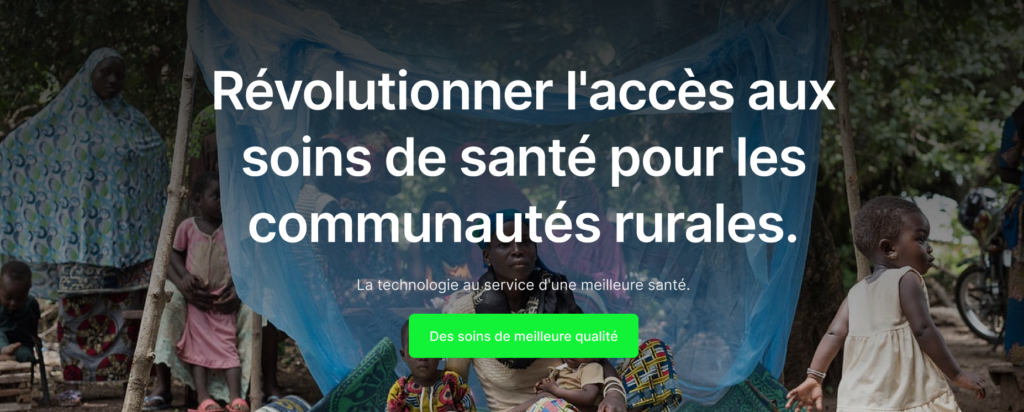In the pursuit of addressing healthcare challenges in rural areas of Benin Republic, the research and development of an eHealth app for sustainable healthcare has emerged as a transformative solution. This article aims to provide a comprehensive overview of the process undertaken to research and develop a prototype for this project. Building upon the existing knowledge and previous articles on eHealth and sustainable healthcare (1, 2, 3, 4) , we delve into the key steps and considerations involved in creating an innovative solution that can improve healthcare access and support sustainable development. we are integrating the innovative MoiseGpt super-application into our eHealth app. Developed by renowned African entrepreneur Alain Towedo Capo-Chichi, MoiseGpt offers a powerful voice assistant feature that enhances user experiences through seamless interaction. This article presents a comprehensive overview of the ongoing research and development process, highlighting the integration of MoiseGpt and its potential to revolutionize healthcare access through a user-friendly voice interface. we also want to take advantage of previous project in the field of health in the region to capitalize the best pratices and lesson learn. For example, the project SATMED,a satellite based communication solution aimed to improve public health in emerging and developing countries.
Identifying the Problem and Research Question
The initial stage involved a meticulous analysis of the challenges faced by individuals in rural communities regarding healthcare access and affordability. By exploring existing literature, and consulting with healthcare experts, a clear problem statement was formulated, leading to the definition of the research question: “What if we design an app that helps tackle the lack of medical service offerings, specifically in rural communities of Benin Republic?”
Conducting User-Centered Research
To ensure the prototype addressed the needs and preferences of the target users, a user-centered research approach was adopted. This involved conducting interviews, surveys, and behavioral studies to gain insights into the healthcare-seeking behaviors, literacy levels, and technological proficiency of the population. These findings served as a foundation for designing an app that is accessible, user-friendly, and tailored to the specific context of Benin Republic.
Developing the Prototype
Armed with the first research insights, the next phase focused on translating the identified requirements into a tangible prototype. Utilizing industry-standard tools like Figma, we were able to design the user interface of the eHealth app, incorporating MoiseGpt’s voice assistant capabilities. The visually appealing and intuitive design takes into account the literacy levels and technological constraints of the target population, ensuring accessibility and ease of use that considered the literacy levels and technological constraints of the target population.
First draft of the prototype website

The first feedback we received from this current version of the web platform for the solution is from our supervision who suggested to make it simplified and easy to read and navigate. The next iteration of the prototype will integrate that and many other feedbacks we are going to receive through our planned survey and further researchs include a field research.
First draft of the mobile app prototype

Iterative Testing and Refinement
To ensure the prototype met user expectations and delivered a seamless experience, iterative testing and refinement were conducted. Next stage of the Usability tests will be carried out with representative users from rural communities so collect provided valuable feedback on the app’s features, navigation, and overall usability. This iterative shall process helped identify and rectify any usability issues, ensuring a user-centric and effective design.
Planned Ethnographic Research for Solution Refinement
In our commitment to continuously improving the proposed solution, a planned ethnographic research study will be conducted in the upcoming summer or next year. This research approach will involve immersing researchers in the rural communities of Benin Republic to observe and document the daily lives, healthcare practices, and unique challenges faced by the residents. By gathering in-depth qualitative data, this ethnographic research aims to further refine the proposed eHealth app, ensuring it is truly aligned with the needs, behaviors, and cultural context of the target population.
Conclusion
The process of researching and developing a prototype for sustainable healthcare has been a journey driven by the vision of improving healthcare access and supporting sustainable development in Benin Republic. By identifying the problem, conducting user-centered research, developing the prototype, and engaging stakeholders, the project has made significant strides towards creating an innovative eHealth app that can bridge the gap in healthcare services and contribute to the well-being of rural communities. The planned ethnographic research study will provide invaluable insights for further refining the proposed solution and ensuring its efficacy in addressing the specific needs of the population. The lessons learned and experiences gained from this process will pave the way for a more inclusive, accessible, and sustainable future in healthcare delivery.